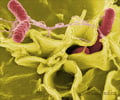The risk of developing diarrhea can be reduced by taking probiotics, shows study.

Pooling evidence from a large number of published research studies examining the effects of probiotics, RAND researchers found consistent evidence that probiotics can benefit people who are taking antibiotics. The findings are published in the May 9 edition of the Journal of the American Medical Association.
"We found a clear beneficial effect of probiotics in preventing or treating antibiotic-associated diarrhea," said study co-author Sydne J. Newberry, a nutritional scientist and a researcher at RAND, a nonprofit research organization. "However, more work is needed to determine which types of probiotics work best, which patients are most likely to benefit from probiotics and whether there are any risks in using them."
As many as 30 percent of patients who take antibiotics suffer from diarrhea, a side effect that is a key reason why some patients do not follow through with a full course of antibiotic treatment. Interest in the possibility that probiotics might help or prevent this type of diarrhea has grown in recent years, resulting in a proliferation of individual studies.
Researchers from the RAND-based Southern California Evidence-Based Practice Center conducted an extensive review of the medical literature to find studies that examined whether probiotic use can prevent and treat antibiotic-associated diarrhea. Researchers pooled results from the studies together to gain a clearer understanding of whether probiotics can prevent or treat antibiotic-associated diarrhea.
Use of probiotics was associated with a 42 percent lower risk of developing diarrhea when taking antibiotics as compared to not using probiotics. The RAND analysis estimates that 13 people would need to use probiotics in order to prevent one case of antibiotic-associated diarrhea.
Advertisement
The RAND team says that future efforts to study the effects of probiotics should try to determine whether some strains or combinations of probiotics work better than others, work best with specific antibiotics and whether use of probiotics for antibiotic-associated diarrhea is associated with any health risks.
Advertisement














